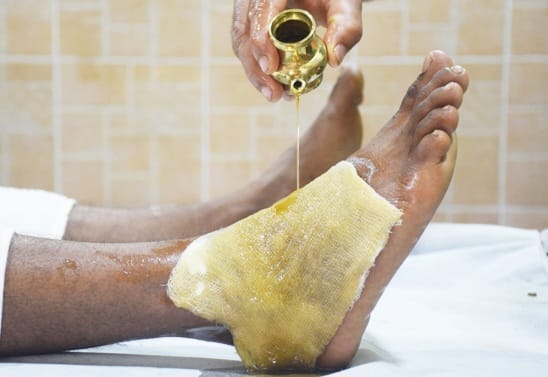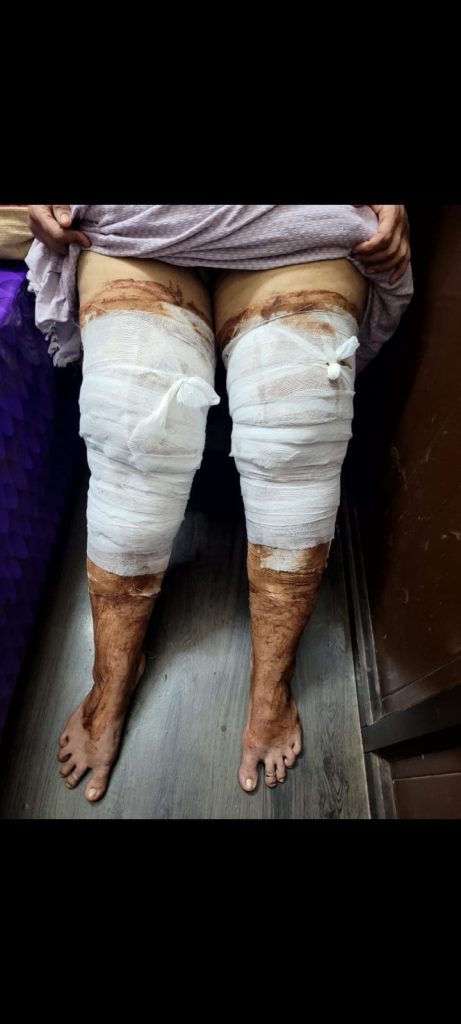Ligament injuries can be painful and limit mobility, but Ayurveda offers a holistic, non surgical way to heal them naturally. At Ayushkamiya Ayurveda, we combine classical Ayurvedic science with traditional ancestral therapies including our unique oil free Lepana, Kashayams, and regenerative treatments to restore joint strength, flexibility, and function from the root.

Modern Medical Overview of Ligament Injury
Ligaments are tough, fibrous connective tissues that connect one bone to another, providing stability to joints. Injury to a ligament occurs when it is stretched or torn, commonly seen in knees, ankles, and shoulders.
Modern medicine classifies ligament injuries into Grade 1 (mild sprain), Grade 2 (partial tear), and Grade 3 (complete tear). Conventional management includes rest, physiotherapy, and, in severe cases, surgery.
However, these treatments often focus mainly on mechanical repair and may not fully restore the natural strength and flexibility of ligaments. This is where Ayurveda the ancient science of life offers a holistic, regenerative, and non surgical approach to heal ligament tears naturally.
At Ayushkamiya Ayurveda, we combine classical Ayurvedic principles with ancestral traditional treatment methods to restore ligament strength, stability, and flexibility.
Ayurvedic Understanding of Ligament Injury (Snayugata Vata)
In Ayurveda, ligaments (Snayu) are extensions of Mamsa Dhatu (muscle tissue) that provide joint stability. Injury to these ligaments is described as Snayugata Vata, caused by an imbalance of Vata dosha due to trauma (Abhighata), overexertion, or degeneration.
When aggravated, Vata leads to pain, stiffness, and loss of function often accompanied by Pitta vitiation (inflammation, heat, and burning) in acute injuries.
Causes (Nidana) of Ligament Injury in Ayurveda
Ayurveda identifies several causative factors (Nidanas) for Snayugata Vata or ligament damage:
Abhighāta – Trauma, sports injury, fall, or sudden jerk
Ati-vyayama – Overexertion or excessive exercise
Ati-vāta-sevana – Excess exposure to cold, wind, or travel
Vega-dhāraṇa – Suppression of natural urges
Asamyak āhāra – Improper, dry, or irregular diet
Dhātu-kṣhaya – Tissue depletion or degeneration
Vibandha (Constipation) – Increases Vata and stiffness
Improper posture or repetitive strain
In traumatic conditions (Abhighata), both Vata and Pitta are aggravated hence treatment focuses on balancing both.
Ayurveda’s Regenerative Power in Ligament Healing

Ayurveda is the science of tissue regeneration and repair (Dhatu Poshana and Rasayana Chikitsa). It plays a significant role in all grades of ligament tears:
Grade 1 & 2: Promotes repair and strengthens damaged tissues
Grade 3: Strengthens surrounding ligaments and joints, restoring stability and mobility
Even in conditions like meniscal tear, Ayurvedic management improves recovery and quality of life naturally.
Phases of Ayurvedic Treatment for Ligament Injury
Ayushkamiya Ayurveda follows a phased healing approach addressing inflammation, pain, and regeneration step by step.
Phase 1: Acute / Initial Stage Management (15–40 Days)
The duration varies from 15 to 40 days depending on the severity of the injury. This stage focuses on pacifying Vata and Pitta, reducing inflammation, and preventing tissue degeneration.

Treatments include:
Ayushkamiya Lepana Therapy (Oil-Free Herbal Paste):
A unique ancestral formula containing Guggulu, arrowroot powder, dried aloe vera gel, shilajit, and other herbs.
It soothes inflammation, strengthens local tissues, and accelerates healing without using oil.
Dhara Therapy:
Pouring of medicated decoctions to balance doshas.
Pinda Sweda (Fomentation Therapy):
Relieves stiffness and enhances circulation.
Internal Medicines:
Amrithotharam Kashayam, Dhanwantharam Kashayam, and other customized medicines according to dosha and condition.
Goal: Pain relief, inflammation control, and preparing the body for regeneration.
Phase 2: Regenerative and Strengthening Phase
Once acute symptoms subside, the focus shifts to regeneration and long-term stability. Therapies include Abhyanga with Bala Tailam, Ksheerabala Tailam, and Rasayana herbs that strengthen Snayu (ligaments) and Asthi (bones).
Goals:
Rebuild ligament integrity
Improve flexibility and joint strength
Prevent recurrence of injury
Why Choose Ayushkamiya Ayurveda
At Ayushkamiya Ayurveda, we blend classical Ayurvedic wisdom with traditional family practices handed down through generations. Our therapies are not just textual but living traditions — perfected through continuous practice and observation.
Key Highlights:
Combination of classical and traditional treatments
Oil-free Lepana therapy unique to our lineage
Personalized dosha-based treatment
Focus on regeneration, not just pain relief
Centuries-old ancestral formulations preserved in purity
Ayushkamiya Lepana Therapy – A Signature Healing Method
Our Lepana formulation is a heritage remedy passed down through generations. Prepared freshly with Guggulu, arrowroot powder, dried aloe vera gel, shilajit, and supporting herbs, this paste:
Reduces Vata Pitta aggravation
Enhances blood flow to ligaments
Aids tissue regeneration
Strengthens nearby muscles and joints
This makes it one of the most effective Ayurvedic external therapies for ligament tears and musculoskeletal injuries.
Ayushkamiya Ayurveda Philosophy
We believe in “Healing through Heritage” combining timeless Ayurvedic science with the practical wisdom of our ancestral physicians. Every treatment is individualized, holistic, and aimed at restoring natural harmony.
Conclusion
Ayurveda offers far more than pain relief it provides a complete system of tissue repair, strengthening, and regeneration.
At Ayushkamiya Ayurveda, our classical + traditional treatment approach helps patients recover from ligament injuries naturally and regain full mobility with improved quality of life.
Visit Ayushkamiya Ayurveda
Experience authentic Ayurvedic healing for ligament tears, meniscus injuries, and joint disorders.
👉 Book your consultation today and begin your journey towards natural recovery and strength.
Ayushkamiya Ayurveda Healing Through Heritage

